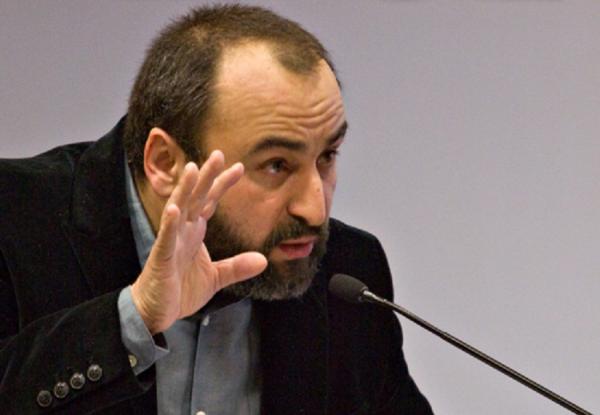Q&A with NEH Public Scholar Costica Bradatan


Name: Costica Bradatan
City and State: Lubbock, TX
Book Title: In Praise of Failure
Publication Date: 2019
Publisher: Harvard University Press
-
Tell us the first thing you did when you learned you received an NEH Public Scholar grant. I was in New Delhi at the time, on the beautiful campus of the Jawaharlal Nehru University. I knew a decision would be coming soon, but, given the fierce competition, I wasn’t really hopeful, so you can imagine the surprise. When I got the notification from the NEH, after an initial moment of disbelief, I got out into the dark (because of the time difference, it was quite late) and took a long walk.
-
What's your writing or academic background? All of my degrees are in philosophy, even though my work has been quite interdisciplinary (apart from philosophy proper, I’ve worked on topics in religion, film, literature, and what not). I have no formal training in writing, but I’ve always had an intimate relationship with it, as one tends to have with one’s vices.
-
How did you come to choose this book project? A few years ago I wrote a short essay on failure that proved unusually successful. I wasn’t intent on writing a book on failure at that time; all I wanted was to toy with an idea. But the tremendous response I got from readers from all over the world convinced me that there was a genuine interest in the topic. Someone who had translated it into Vietnamese, for example, wrote me to say how much the piece meant for him. “In our culture,” he said, “failure is something like sin, inseparable from shame, you just can’t afford to admit failure. Your piece helped me see things differently.” I was humbled by how much people would read into my little essay, and I felt some kind of obligation to do more with it. Unwittingly I had made a promise and now I had to keep it.
-
Why do you feel it's important to reach a wide readership with this work? I’ve come to believe that the scholars’ isolation from the rest of their communities is one of the major neglected crises in today’s academia. Those of us working in the humanities especially need to find our way back to an educated, yet non-specialist readership. If we cannot establish and maintain a meaningful conversation that goes beyond our strict specialties – that is, if we don’t find anything to tell our fellow-humans, in clear language, about what it means to be human – then the humanities are unable to fulfill one of their fundamental functions.
-
As a philosopher, what is the biggest challenge of writing for a general audience? Personally, I think that philosophy, in so far as it involves a textual expression, is a form of literature. So I take the act of writing to play a central part in philosophy. I could of course, in response to your question, say that the biggest challenges lie in the loss of rigor, the danger of trivialization, and so on, but I am not going to say that. Since philosophy is a form of literature, the challenges the philosophical writer faces are not very different from those of other writers. And they are big challenges, if one takes one’s job seriously. One more thing. There is a widespread notion that public humanities involve some kind of “watering down” of scholarly contents. This is a dangerous prejudice, I think. Public humanities are not about “watering down,” but, above all, about delivering the same idea in different stylistic registers. And the ability to say the same thing in more than one way should be celebrated, not belittled; for it is a strength, not a weakness. “Readability” has its own demands, which are high and difficult: usually, it’s harder to write an accessible text on a difficult topic than a jargon-laden one. Moreover, this “translation” itself serves to test our results and strengthen the coherence of our scholarship – indeed, it brings more clarity to our ideas and to ourselves. In the very process of addressing ourselves to a different audience, we come to understand ourselves better. I learned quite a bit about myself – and I hope I will be forgiven for using a personal example here – while working on my previous book, which was meant for a non-specialist audience: Dying for Ideas. The Dangerous Lives of the Philosophers (Bloomsbury, 2015). Whether this is also a good book, in and by itself, is a different matter, and it’s not for me to decide.
-
How has the Public Scholar grant made a difference in your project? The tenure of my grant hasn’t started yet, but I’m sure it will make a huge difference. It will give me exactly what I need – time – and when I will need it most: at the final, crucial stage of the project, when all you’ve been working on for years, all those disparate bits and pieces, scattered components and loose threads, are coming together to form something with a physiognomy and a voice of its own – a book.
-
Why should other writers apply to the Public Scholar Program? The Public Scholar Award strikes me as a fantastic opportunity for anyone who seeks to evade the rather narrow confines of strict specialization – frankly, for anyone who cares about the humanity of the humanities.
The NEH Public Scholar program for well-researched books in the humanities for a general audience is open for a third round of applications. Click here to learn more about this grant opportunity and here to download the .pdf with the Public Scholar application guidelines. The application deadline is February 1, 2017. Contact @email with questions.